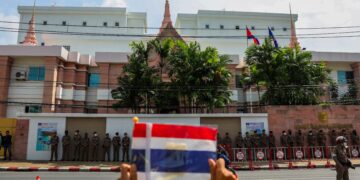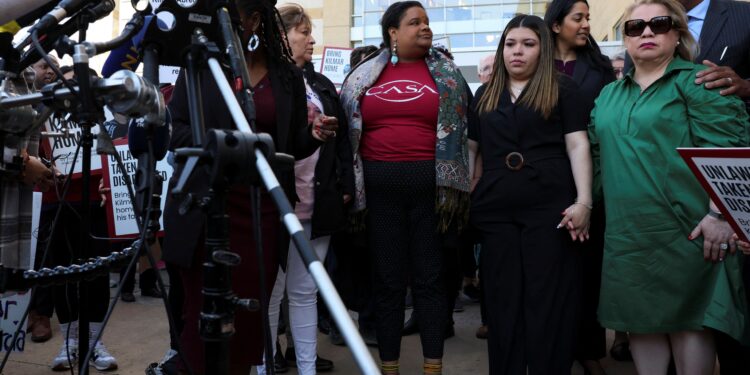(Adds missing word to headline)
GREENBELT, Maryland (Reuters) -A U.S. judge on Tuesday demanded U.S. officials provide documents and answer questions under oath about what it had done to secure the return of a man wrongly deported to El Salvador, ramping up an inquiry into whether the Trump administration defied a court order.
U.S. District Judge Paula Xinis said at a hearing in Greenbelt, Maryland that she would not immediately hold the government in contempt of court, but said the documents and closed-door testimony would help her weigh the Trump administration’s compliance with her earlier order to “facilitate” Kilmar Abrego Garcia’s return.
The judge last week ordered Republican President Donald Trump’s administration to provide her with daily updates about the steps it was taking to get him back. On Tuesday, she said the administration had not given her any information of value about what it had done.
“There will be no tolerance for gamesmanship or grandstanding,” said Xinis, an appointee of Democratic President Barack Obama. “To date, what the record shows is that nothing has been done. Nothing.”
At the same time, the judge said she was not ordering the administration to ask El Salvador’s government to return Abrego Garcia – even though she called its refusal to ask for his release “stunning.”
“I’m not ordering you to do that,” Xinis said. “I don’t know if I’ll ever be there.”
Abrego Garcia was deported on March 15 despite an order protecting him from removal to El Salvador. His case is one of several that have sparked concerns among Democrats and some legal analysts that Trump’s administration is willing to disregard the judiciary, an independent and equal branch of government.
Administration officials have accused the judiciary of overstepping and interfering with the executive branch’s ability to conduct foreign policy. Trump has said his administration would bring Abrego Garcia back if the Supreme Court directed it to.
On Tuesday, Xinis said she would require the four officials with the U.S. Department of Homeland Security and U.S. Immigration and Customs Enforcement who had submitted sworn declarations in the case to sit for depositions by April 23.
Government lawyer Drew Ensign said officials may respond to certain questions by asserting the attorney-client privilege, which protects lawyers from being compelled to disclose information their clients have told them.
Ensign also said the administration interpreted Xinis’ order to “facilitate” Abrego Garcia’s return to mean they should remove any U.S. barriers to his return to the United States.
He said the administration had done that by officially asserting in a court filing earlier in the day that if Abrego Garcia were to show up at a port of entry or a U.S. embassy, he would be allowed into the United States and then immediately taken back into custody.
Xinis said that interpretation of the meaning of ‘facilitate’ is contrary to “the plain meaning of the word.”
‘POLITICAL GAMES’
The U.S. Supreme Court last week largely upheld Xinis’ order to “facilitate and effectuate” Abrego Garcia’s return following a challenge by the Trump administration, but said the term “effectuate” was unclear and might exceed the court’s authority.
Secretary of State Marco Rubio said during a meeting with Trump and El Salvador President Nayib Bukele at the White House on Monday that the president, not courts, conduct U.S. foreign policy.
Bukele told reporters at the meeting he did not have the power to return Abrego Garcia to the U.S.
At Tuesday’s hearing, Ensign cited Bukele’s comments, saying “ascertaining the position” of the Salvadoran government was “an important part of compliance” with Xinis’ order.
Before the hearing, Abrego Garcia’s wife, Jennifer Vasquez Sura, urged Trump and Bukele to return her husband.
“I find myself pleading with the Trump administration and the Bukele administration to stop playing political games with the life of Kilmar,” Vasquez Sura told a crowd of protesters.
U.S. Senator Chris Van Hollen of Maryland, a Democrat, said in a statement on Monday that if Abrego Garcia was not home by “midweek,” he would travel to El Salvador to discuss his release.
(Reporting by Andrew Goudsward in Greenbelt, Maryland and Luc Cohen in New York; Additional reporting by Jeff Mason in Washington, Kristina Cooke in Los Angeles, and Tom Hals in Wilmington, Delaware;Editing by Noeleen Walder and Deepa Babington)
By Andrew Goudsward and Luc Cohen


















